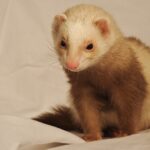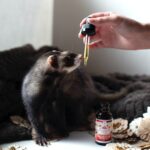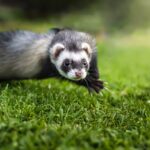Can Ferrets Eat Hay? The Truth About Feeding Your Furry Friends
Ferrets, those adorable and playful creatures, have a distinct dietary requirement that sets them apart from other pets. While hay is commonly associated with the diets of many herbivorous animals, it is not recommended as a staple food for ferrets. In this blog, we will delve into the reasons behind this recommendation, exploring the potential dangers and health concerns that hay can pose to our beloved ferrets.
The Hazards of Hay for Ferrets: What Every Owner Should Know
While hay is generally considered a safe and healthy food for herbivores like rabbits or guinea pigs, it is not suitable for ferrets. This is mainly due to the physiological differences in their digestive systems. Ferrets have a short digestive tract that is specifically designed to process high-protein diets. Hay, on the other hand, is high in fiber and low in protein, making it difficult for ferrets to digest effectively.
Moreover, hay can lead to blockages within the gastrointestinal tract of ferrets. These blockages can cause severe discomfort and even life-threatening conditions if left untreated. As responsible ferret owners, it is crucial to prioritize the health and well-being of our furry friends by avoiding the inclusion of hay in their diets.
Recognizing Symptoms and Reactions in Ferrets Consuming Hay
If, by any chance, your ferret ingests hay, it is important to be aware of the potential symptoms or reactions they may exhibit. These can include digestive issues, such as diarrhea or constipation. Ferrets may also experience abdominal pain, loss of appetite, or even vomiting. Observing these signs can be an indication that the introduction of hay into their diet requires immediate attention.
Exploring Safer Food Options for Your Ferret
While hay is not recommended for ferrets, numerous safe alternatives can provide them with the necessary nutrition and enrichment. High-quality ferret kibble, specially formulated to meet their dietary requirements, should form the basis of their diet. Additionally, including small amounts of cooked meat, such as chicken or turkey, can offer some variety and ensure a balanced nutritional intake. Always consult with a veterinarian to determine the most suitable food options for your ferret.
Tips to Keep Your Ferret from Accessing Hay
Prevention plays a pivotal role in keeping our ferrets safe. To avoid any accidental ingestion of hay, it is important to store it securely in a location inaccessible to your curious ferret. Utilize pet-proof containers or cabinets to ensure they cannot gain access. Regularly inspect your ferret’s habitat for any hay residue or spillage, promptly removing it to eliminate the risk of accidental consumption. By implementing these simple preventive measures, we can maintain a safe and nourishing environment for our furry companions.
Conclusion
In conclusion, hay is not a suitable food for ferrets due to their unique dietary needs and the potential hazards it poses. Opting for high-protein ferret kibble and incorporating small amounts of cooked meat can provide a balanced and nutritional diet for your pet. Remember, prioritizing your ferret’s well-being entails keeping them away from potentially harmful foods and ensuring a responsible approach to their care. By adhering to these guidelines, we can enjoy the companionship of our magnificent ferrets for years to come.






